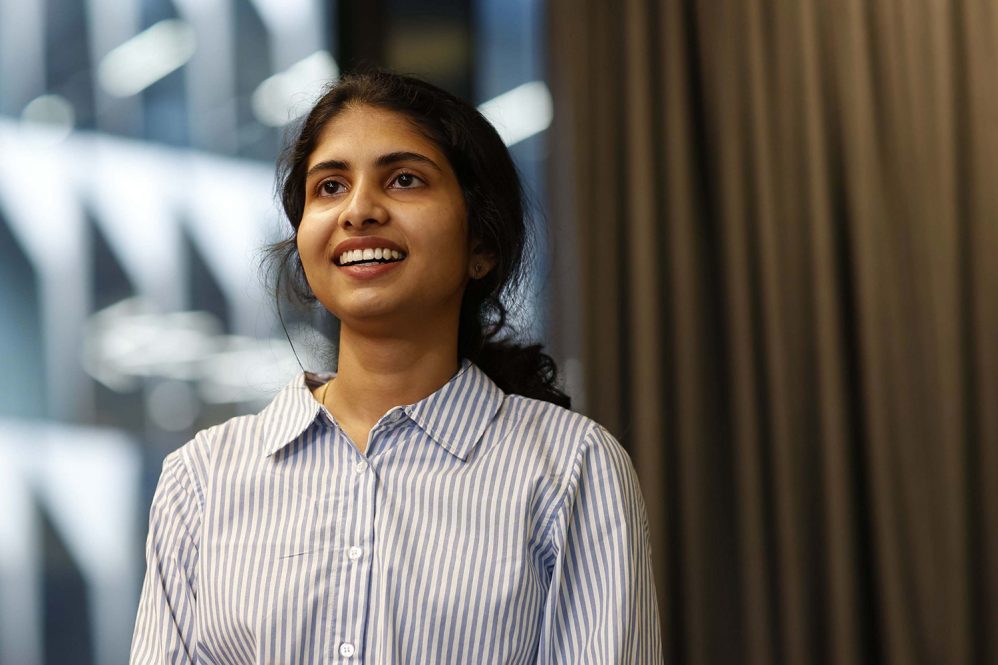UConn doctoral student Anagha Payyambally has been named to the first class of Quad Fellows, an initiative of the governments of the United States, Australia, India, and Japan. This first-of-its-kind scholarship program is designed to build ties among the next generation of scientists and technologists. The Quad Fellowship is operated in consultation with a nongovernmental task force composed of academic, foreign policy, and private-sector leaders from each Quad country.
Payyambally, a native of Kerala, India, is a second-year doctoral student in marine sciences at UConn Avery Point, and plans on completing her degree in 2027.
The Quad program is highly competitive, with only 100 students selected for the initial class among 3,600 initial applicants. Payyambally is just one of 25 students from India to be accepted as a Quad Scholar.
“I am so grateful for achieving this and happy for my inner-self,” says Payyambally. “The process to be picked was not an easy one and I had my course and lab work in school at the same time.”
The selection process consisted of an application and two interviews – the second one with a panel of reviewers. Payyambally said that one was unique because it took place at 3:30 a.m. Eastern time because the interview was based out of India.
“That last interview was a great experience because the panelists were able to ask questions on any topics, it wasn’t based just on academic work,” says Payyambally. “Plus, it was the first time I did an interview at 3:30 a.m.!”
The Quad Fellowship is the first multinational scholarship and educational fellowship program specifically supporting students in STEM. Quad Fellowship programming uniquely focuses on elevating fellows’ ability to use science and technology for social good.
Quad Fellows receive an award of $50,000, which can be used for tuition, research, fees, books, room and board, and related academic expenses.
Another highlight for Quad Fellows is a retreat, which took place this summer in Melbourne, Australia, which Payyambally attended in June.
“It was an amazing experience to meet with different people from around the world,” says Payyambally. “We heard from Nobel laureates, ambassadors, and entrepreneurs. It gave us a basic foundation of what all of us want to do for society after we complete our doctoral programs. We looked at topics like global climate change and how artificial intelligence affects the future.”
The Quad Fellowship hopes to develop a network of science and technology experts committed to advancing innovation and collaboration in the private, public, and academic sectors, in their own nations and among Quad countries. The program builds foundational understanding among Quad Fellows of one another’s societies and cultures through cohort-wide trips and robust programming with each country’s top scientists, technologists, and politicians.
“I am so proud to see Anagha be honored as a member of the inaugural group of Quad Fellows, following their rigorous selection process,” says Cara Manning, assistant professor of marine sciences, who also serves as Payyambally’s advisor. “Anagha came to UConn from India with exceptional academic achievements and the goal of studying the role the oceans play in exchanging greenhouse gases with the atmosphere. As atmospheric greenhouse gas concentrations continue to increase and the oceans undergo changes such as warming, acidification, and deoxygenation, there is a critical need for research that enables us to quantify the rate of net uptake or emissions of greenhouse gases from the oceans and predict future changes.”
Payyambally plans to return to India and continue her research there once she completes her studies at UConn.
“I am excited that Anagha is being supported to conduct this research by the Quad Fellowship and to have an opportunity to meet other outstanding students who are pursuing graduate degrees in the United States,” says Manning. “As the only oceanographer in the cohort of fellows, the programming available to the fellows provides a wonderful platform for Anagha to share our group’s research with other academics and people in government, private, and nonprofit sectors and an opportunity for her to learn about the diverse career opportunities that are available to students with STEM graduate degrees.”



